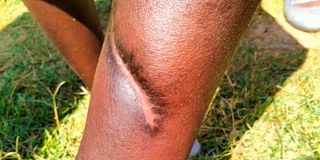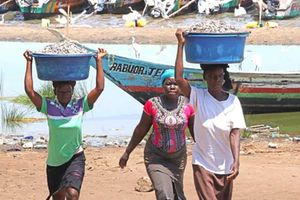How food, climate crises expose women to waterborne diseases

Fisher women in Maembe Beach, Nyakach, Kisumu County on October 30, 2024. The women are part of tens of households that abandoned their farmlands and homes due to Lake Victoria's backflow.
What you need to know:
- The aquatic animals, which resemble catfish but measure close to 10 centimetres, are known as ‘nyapus’ in Dholuo.
It’s a chilly Thursday morning.
As fishermen dock their boats on the shores of Lake Victoria in Nyakach, Kisumu County, a group of women make their way into the lake.
While one would confuse them for fishmongers, the women, armed with nothing but plastic containers, walk into the deep cold waters.
With their bodies fully immersed up to the shoulders, they are seen uprooting hyacinth and rising up at intervals while holding tiny snake-like aquatic animals.

A woman displays a scar sustained following a hippo attack while fishing at the shores of Lake Victoria on October 30, 2024.
The aquatic animals, which resemble catfish but measure close to 10 centimetres, are known as ‘nyapus’ in Dholuo.
The fish are either sold to fishermen in Siaya, Homa Bay and Uganda or consumed by the women.
Catching the fish is, however, not an easy task. The women have to spend the better part of their day deep in the cold lake waters from as early as 6am.
For a maximum harvest, they stay in the waters until late in the evening, a practice that has left them exposed to diseases such as bilharzia, pneumonia, malaria and typhoid.
While in the lake, the women also risk snake bites, crocodiles and hippo attacks.
“It is not an easy task, if I had an option of working as a farm hand, I would gladly accept the job, “says Ms Ruth Akoth, a resident of Sango Rota, Nyakach West.
The 45-year-old widow, a sole provider for her five children, says the activity always leaves her exhausted by the end of the day such that she can barely do house chores.
Apart from fatigue, Ms Akoth explains that she has to visit a health facility every two weeks to seek treatment for waterborne diseases or pneumonia.
“The water is very cold, exposing us to pneumonia. There are also worms that attack us, leaving most of us with painful swollen stomachs. While some get treated and recover, others don’t make it,” she says.
The traditional fishing method is majorly practised by women, with 70 per cent being widows.
Ms Akoth says most of the women are here since their parcels of land got submerged.
The 45-year-old explains that before she resorted to the traditional fishing method, she worked as a fish monger with her husband in Nakuru.
After the death of her husband during the 2007 post-election violence, the widow relocated to their rural home in Sango Rota, Nyakach.
Back home, she would engage in vegetable farming along the shores of Lake Victoria until 2020 when the lake burst its banks, leading to a backflow.
Mr Evans Gichana, Kisumu County Director of Climate Change, says the backflow is a result of heavy rains and changing weather patterns due to climate change.
The prolonged rains, he says, causes the rising water levels in the lake, resulting in a spillover.
Ms Akoth says her one-acre land was among the farms swallowed by the lake in the process and it has since remained submerged.
“After the incident, looked for alternative sources of income, including working as a farm hand, unsuccessful, since most of the land here is already submerged by the lake,” she says.
Ms Akoth explains that her only available option was to go deep into the lake to catch the aquatic animals. All she needed to do was to identify parts of the lake invaded by water hyacinth and then uproot the weed to get to the fish.
“I do not have a fishing boat. That is also the case for most of the widows here. Embracing the traditional method of fishing is the only option we have,” she says.
On a normal day, one is likely to find over 60 women in the lake sourcing for the fish, which they say barely sustains their needs.
Ms Anne Alouch, another resident, says despite spending many hours in the water body, she only harvests fish worth Sh200 in a day.
The mother of six says she gets in the lake at 6am and takes a break at around 10 am to go sell whatever she has caught
She then goes back home to attend to house chores and gets back to the lake at 12pm for another four hours’ shift.
“A single fish is sold at Sh1 despite the exhaustion,” says Ms Aluoch, adding that whatever she gets from the lake is channelled to the family’s daily needs.
She adds: Sadly, whenever we fall sick, the income can barely settle the hospital bill.”
Before the lake backflow, Ms Aluoch says most of her earnings were generated from a farm, where she cultivated tomatoes and African leafy vegetables.
With her half an acre land and home still submerged, Ms Aluoch together with her children have put up a temporary structure on higher grounds hoping that the water levels will reduce.
While the water levels have subsided in some areas, some of the farmlands have remained abandoned due to hippopotamus invasions.
“The hippos attack our farms as early as 5pm, eating our vegetables and other food crops,” says Ms Aluoch.
A medical staff at Sango Rota health facility who spoke on condition of anonymity, says cases of waterborne diseases, especially bilharzia, are common in the lakeside.
He added that other common ailments presented by the locals include typhoid, pneumonia and malaria, which account for 70 per cent of illnesses reported in the facility.
“Sadly, we can only diagnose and treat malaria. We do not have the right drugs to administer to the other patients and we normally refer them to either Pap Onditi Sub-county Hospital or Kisumu County Referral Hospital.
“Quite a number of the patients visit our facility with swollen stomachs, itchy skin, diarrhoea and blood in their urine.”
According to West Nyakach chief Seth Oluoch, the backflow has left over 2,000 acres of land submerged in water.
“The few individuals who are now farming are also staring at food insecurity following frequent invasions by hippos, which have been brought closer to humans due to the backflow,” he said.
Mr Joseph Ogodo, chairman Sango Environmental Degradation Rescue, a community-based organization, says there is need to provide the women, especially the widows, with an alternative source of income to cushion them against the hard times.
Mr Ogodo says apart from being exposed to the waterborne diseases and the aquatic animal attacks, the activity also leaves the women exhausted.
“We are appealing to the government and other private organisations to come down to Sango Rota to witness the women’s tribulations and help support them economically,” said Mr Ogodo.





